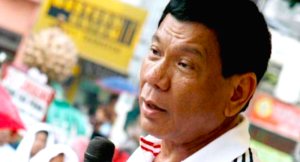Three years into the administration of Philippines strongman President Rodrigo Duterte and despite rising international condemnation, Duterte's bloody war on poor drug users continues unabated, with a pattern of unlawful executions under the guise of police sting operations, the human rights group Amnesty International said in a report released Monday.

"Three years on, President Duterte's "war on drugs" continues to be nothing but a large-scale murdering enterprise for which the poor continue to pay the highest price," said Nicholas Bequelin, Amnesty's Regional Director for East and Southeast Asia. "It is time for the United Nations, starting with its Human Rights Council, to act decisively to hold President Duterte and his government accountable."
[Update: The Human Rights Council adopted the resolution on July 11.]
Philippines police accept responsibility for more than 6,000 killings, saying they came in raids in which armed suspects fought back against police, but the actual number of killings, many conducted by shadowy vigilante groups suspected of links to the police may be twice or three times that figure. Opposition legislators said in February 2018 the death toll had reached 20,000.
Amnesty said the true number may never be known because "deliberate obfuscation and misinformation" from authorities makes it impossible to get an accurate tally of the killings, which targeted poor and marginalized communities that lack the means to challenge police misconduct and abuses.
It's not just the number of killings that is in doubt, but the circumstances surrounding them. While police typically claimed self-defense, witness and other information developed by Amnesty suggests a pattern of "extrajudicial executions," a polite way of saying murders by police. The claim that police were only defending themselves "doesn't meet the feeblest standards of credibility," Amnesty concluded.
A Filipino forensic expert interviewed by Amnesty said that police reports of "buy-bust" operations she had examined did not meet the minimum standards of plausibility: "It's so consistent, it's a script. In fact, when you see the report, it looks like a template," she said.
As Amnesty reported:
In an all-too-typical case, police claimed Jovan Magtanong, a 30-year-old father of three, fired at them, and that they recovered a .38 caliber pistol and baggies of illegal drugs from the scene of the incident. Witnesses said he was sleeping alongside his children when officers knocked on his house door asking for another man. Jovan's family said he did not own a gun and had not used drugs for over a year.
"They killed him like an animal," a family member told Amnesty.
Amnesty's latest report builds on an January 2017 investigation showing police had systematically targeted mostly poor and defenseless people across the country, planting "evidence," recruiting paid killers, stealing from the people they kill, and fabricating official reports. That report centered on metro Manila, then the epicenter of the killings, but the new report follows the pattern of killings to Bulacan province in Luzon, the new hotbed of drug war atrocities.
Amnesty examined 27 killings there during 20 incidents, 18 of which were official police operations. Based on witness accounts and other information, it concluded that half were extrajudicial executions. Amnesty said it couldn't develop enough information to qualify the other deaths, but said they pointed broadly to previous patterns of executions.
Amnesty also highlighted the role of "watch lists" of people in communities suspected of using or selling drugs. The "watch lists" are compiled by local officials under pressure to show results in the war on drugs by collecting the names of suspected drug users and sellers. "These lists effectively serve as guides for police of people to arrest or kill," Amnesty said. Amnesty "views these lists as unreliable, illegitimate, and unjustifiable," the group said.
"The Duterte administration has created a deadly numbers game where officials must manufacture lists and monitor them, regardless of whether the individuals on it actually use or sell drugs. This insatiable and vicious system rewards blind compliance and murder," said Nicholas Bequelin.
And the police act with impunity. Of all the killings acknowledged by the police, only one, the murder of 17-year-old Kian delos Santos in August 2017, which generated global media attention, actually saw police officers punished. But the man in charge of the police there, Senior Superintendent Chito Bersaluna, suffered only a period of "administrative leave" and is now working the drug war in Bulacan.
"The transfer of senior police officials to regions where killings then surged is an alarming indicator of impunity," said Bequelin. "The Duterte administration's continuing efforts to deny and deflect responsibility are nothing short of mendacious."
The achingly callous attitude of Philippines drug warriors toward their fellow citizens was made clear last week when Ronald Dela Rosa, now a senator but earlier the metro Manila police chief and lead conductor of Duterte's drug war, defended the killing of a three-year-old girl in a drug raid near Manila.
"Shit happens," he said as he accused the girl's father of using her as a human shield.
"It is not safe to be poor in President Duterte's Philippines," said Bequelin. "All it takes to be murdered is an unproven accusation that someone uses, buys, or sells drugs. Everywhere we went to investigate drug-related killings ordinary people were terrified. Fear has now spread deep into the social fabric of society."
Duterte and his henchmen have reacted to the International Criminal Court by leaving it, and have stonewalled attempts by domestic watchdogs to investigate their drug war crimes. Now it's time for the UN to step up.
This work by StoptheDrugWar.org is licensed under Creative Commons Attribution-ShareAlike 4.0 International
Comments
Trump thinks Duterte is doing a great job
God knows what Trump would do if he could get away with it.
In reply to Trump thinks Duterte is doing a great job by saynotohypocrisy (not verified)
Trump and Duterte are one in the same form of evil...
Add new comment